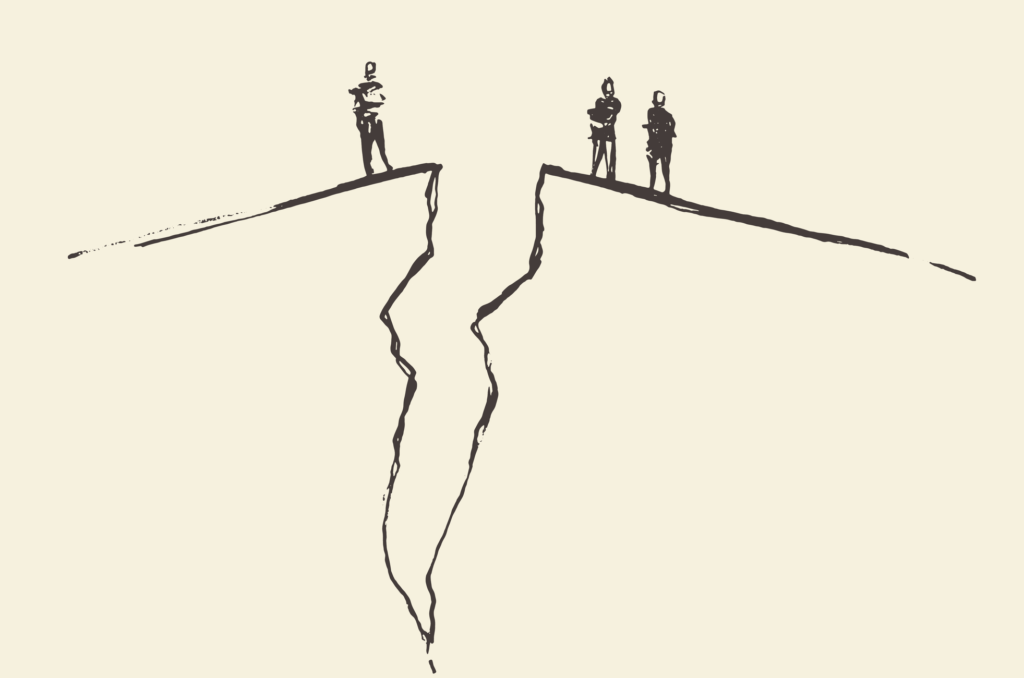
What can we do about the increase of barbarity in global conflicts and accentuated polarity in national discourse? While anti-authoritarian militias may currently be more disjointed than in previous years, a recent study suggests as many as 25 million Americans believe the use of force is justified in support of political or social ends. Many leaders we coach are also facing splits in their cultures: sales vs product, west vs east, management vs labor, and so on.
Now more than ever it’s important to act from a holistic perspective, not a narrow one. Today, I’m sharing 3 practices that can help achieve this inclusive perspective.
- Feel What Is Driving the Other
In any split, there will be one side you are more comfortable with. Investigate the other side of the polarity. If I find myself more comfortable listening to liberal rhetoric, I put in the effort to understand the conservative POV. Especially the more extreme expressions on both sides that I find personally vomit-worthy. Dig into what is underneath the dynamic. It’s important to understand, even empathize with where the energy driving these differing perspectives is coming from: the fear of change, loss of faith in the future, anger at past betrayals.
When we fail to feel where other human beings are coming from, we are at risk of pseudo-speculating. Treating them as if from a different species, not worthy of human dignity, such that normal ethics that protect against emotional or criminal atrocity go out the window. With the weapons we now have at team level or internationally, that is the fastest way to destroy company, country and planet.
- Own The Stand You Are Taking
I have seen leaders try to bridge a divide by avoiding the conflict, speaking out of both sides of the mouth and telling each side what they want to hear. The result: a cesspit of back-biting, underhanded rumor. There is a huge difference between just being against the horrors of war and actually being a peace zone in which people feel safe and creativity flourishes.
For example, a CEO was facing a split between newer recruits, who were mainly tech execs, and longer term staff. Their Slack channels blow up ferociously, “Are we going to be an East Coast or West Coast company?” Yes, change was happening, for sure, but that geographical divide had nothing to do with it. She owned her stand. “We are becoming a global company.” Their whole industry was evolving from its local roots, and everybody knew it. While it may feel more disturbing at first, confronting the root fears behind the conflict actually makes the culture safer for everyone.
In some situations, you may not be able to avoid the upset and pain that comes from living in a rapidly changing world. People may hate you and fight you for the stands you take and the actions you catalyze. In the midst of all that, you can still be at peace, maintain the perspective of the whole, and bring out the best in those around you.
- Find Your Faith in the Future
I realized recently, in a couple situations, that I was holding myself back from speaking confidently about my vision. The sense of crisis in the world was not the issue for me. If anything, I find that galvanizing. Along the way, however, my belief in a compelling positive future had come from others–mentors whom I deeply respected. Their confidence infected mine. For where I am now, that secondhand confidence no longer cuts it.
It is easier to foresee disastrous outcomes in the world than to notice a deeper emergence of self actualization. You don’t have to be super prescient to anticipate almost unrecognizable change. You don’t have to be a people expert to know what it feels when long-buried toxicities surface to be released, and to suspect that, as a race, we are far from done with that process. What does it take to hold all this as a transition, not a tragedy?
I have found that place in myself. Yes, I am afraid. I am anxious about dozens of tasks and situations I have to address by tomorrow. Scared of all kinds of unrest that may spill out of our current social divides. I am horrified by war. Aware that the pace of change is only likely to steepen.
Perhaps for each of us there is a crisis of confidence to be faced. Maybe many such. For me at least, the breakthrough is not so much a belief in ultimate goodness. It is a different kind of confidence. Unconditional. The feeling that, whatever arises, I am here. And that is enough.
Leaders who emit that kind of faith will continually and successfully bridge the divides that arise to threaten their cultures, and teach others to do likewise. I would love to hear how all this is working for you.
All the best,
David Lesser
